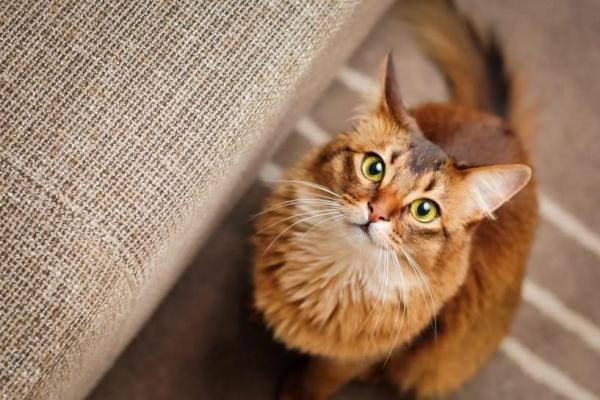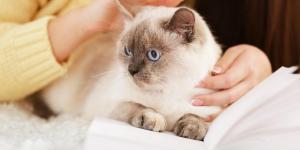My Cat Doesn't Purr - Reasons for Not Purring



See files for Cats
One of the most characteristic, and unique, cat behaviors is purring. It is a defining trait of cats and can only be found in felids and some species of viverrids. As a vocalization, it is usually associated with a feeling of well-being. Not only does it imply the cat is satiated and content, but it can be very comforting for a cat guardian since it one of the signs a cat is happy.
For this reason, if we find that my cat doesn't purr, we will want to know the reasons they are not purring. If purring tell us a cat is happy, if a cat does not purr, are they unhappy? We look at the different reasons a cat has stopped purring and whether we need to do anything about it.
How do cats purr?
The sound of a cat's purr is very special. It is produced in a unique way which is common to other types of cats and one other mammal species. Some animals make similar sounds, but it is not true purring. If you don't know how a cat's purr is produced, you are not alone.
Various theories attest to how a cat makes a purring sound, but it is not fully understood. Some argue the purr sound originates in the thorax. Blood is said to be compressed as it is passed through the diaphragm and air-filled bronchi amplify the vibration. However, a study in the Journal of Zoology[1] suggests that purring is due to modulations of the larynx, altered by respiratory flow.
When do kittens start to purr?
Purring begins at two days of life for a kitten's. It is only one form of communication with their, starting when breastfeeding is taking place. While the little kitten suckles at their mother's teat, they both purr and knead with their paws to stimulate milk from the mother's mammary glands. Not only does it stimulate the flow of milk, but it lets the mother know thet her newborn kittens are feeding properly.
Due to the process of domestication, human beings have supplanted the mother role of cats. Since they do not go out to hunt or find their own resources, cats come to rely on us and maintain some similar behaviors which cats in the wild often lose. Many adult cats will continue to knead us or even suckle on our clothes while purring. Petting can also stimulate a cat's purring, an action which can benefit the health of both cat and guardian.
What does the cat's purring mean?
Purring is an indication of well-being and a state of relaxation, even when a cat is sleeping. However, their purr is also used in other contexts. Some are more negative, as is the case in purring when they are ill or stressed. For example, we may see a cat purring when in a veterinary clinic even though they are in a heightened state of stress. In such cases, the purring is likely an attempt to comfort themselves.
Cats can modulate their purrs into different types. Some are more intense, others use less air or have different speeds. These different types of purr have different meanings. They may show just how relaxed the cat is, but may also show just how anxious they are. They may be used as a request for something and there are likely reasons why cats purr we are yet to understand.
Although we know many reasons why a cat purrs, we need to also know reasons why a cat doesn't purr.
Do all cats purr?
As we have seen, purring is an important part of a cat's communication. However, it is only one of the sounds a cat makes. When our cat doesn't purr, we might think there is something wrong with them. While this may be the case, it is not necessarily a cause for concern in and of itself.
Although most cats will purr when they are relaxed, when we pet them or when they are asleep, not all do. When it comes to purring, we can divide cats into three groups:
- Cat purrs, but almost inaudibly: some cats purr so softly that the only way to hear them is by putting your ear to their body or by putting your hand on their neck to feel the vibration produced.
- Cat doesn't purr at all: other cats simply do not emit this sound as it is not in their character. It doesn't necessarily mean they are unable to due to malformation or disease, it simply may not be a type of communication they use. Different breeds of cat have certain trends when it comes to noises they make, so this may be a factor. However, all cats are individuals and not purring may simply be a character trait. It doesn't mean they don't have a good relationship with their family, simply that they show their affection in different ways.
- Cat has stopped purring: again, without implying there is a disease or problem, it is possible a cat stops purring. As a cat ages and develops, their behavior changes. This could be due to experience, circumstances of a combination of both. However, it is not common for a cat that purred before to stop completely. We will need to observe for any clinical signs of a physical or psychological problem.

My cat doesn't purr or meow
As we have seen, purring is only one type of sound cats make. Meowing is also a common feline vocalization which has similar origins form the time they are a kitten. They use meows in multiple situations, some of which are similar to purring. They include:
- Demand attention: kittens meow at their mother when they want food or attention. Since adult cats often treat humans as parental figures, they will similar meow at us when they want the same.
- In heat: a characteristic of unsterilized cats during their heat period, which can last almost all year round. It's a very high-pitched meow, almost like a scream.
- Enter or exit: if our cat has access to the outside, they may meow to be allowed in or out.
- Plaintive meow: unmistakable and a sign that something bad is happening to the cat. Can due to a disease or even a sign the cat is in pain.
- Greeting: some cats are simply very talkative and will meow at us as a greeting or are simply trying to communicate in some other way.
A healthy cat may not purr, but they will use some other form of communication. If a cat has stopped purring, it may be a sign there is a problem. Below are some reasons this may be the case.
Cat doesn't purr due to disease
When a which normally purrs stops, it is possible they have a disease. Cats don't only purr when they are happy, but it usually occurs when they are alert. If the cat has been weakened by illness, they may not expel the energy required to purr.
Various illnesses can weaken the cat to the point they are unable to purr. If they have a bacterial or viral infection, they may need to rest, but will not necessarily purr when doing so. Certain immunity-compromising diseases such as the feline immunodeficiency virus, commonly known as feline AIDS. However, these are chronic conditions and they should not stop the cat purring all of a sudden, unless they are suffering from a secondary condition.
Upper respiratory problems in cats may lead to them not purring. This may be accompanied by signs of labored breathing. Although we do not know the exact manner by which a cat purrs, it is possible a respiratory infection has affected their ability to purr. In any case, we need to take a cat that stops purring all of a sudden to a veterinarian for diagnosis.
Cat doesn't purr due to trauma
Another reason a cat doesn't purr may be due to physical trauma. If they have been in an accident, such as a road accident or fall, it is likely we will see some other symptoms. This could be the presence of blood in their mouth, limping or other signs. However, this will depend on the nature of the injury. It is possible a cat has damaged the part of their body which affects purring. The cat may also be shaken up or scared due to the accident and will not purr because of this.
If we see any signs our cat has received trauma, we should take them to a veterinarian immediately. They will determine if there is any other injuries which need to be treated.

Cat is not purring due to stress
Even seemingly insignificant changes in a cat's routine can lead to stress. Whether there is a new member of the family, a change of address or even changing their food, the result may be your cat feels anxious. Manifestations of stress and anxiety in cats might include stopping to purr.
Since cats purr when they are happy and content, they may not purr beside you until their stress problem is managed. There are other ways you can tell if a cat is stressed, including not eating or becoming aggressive. You will need to assess their situation and work out why this has happened. If you cannot, you will need to take them to a veterinarian to achieve the correct diagnosis, especially as it may be linked to an underlying disease.
Take a look at our video below to understand more about why cats purr:

If you want to read similar articles to My Cat Doesn't Purr - Reasons for Not Purring, we recommend you visit our Facts about the animal kingdom category.
1. Sissom, D. E. F., Rice, D. A., & Peters, G. (1991). How cats purr. Journal of Zoology, 223(1), 67-78.
https://zslpublications.onlinelibrary.wiley.com/doi/10.1111/j.1469-7998.1991.tb04749.x







